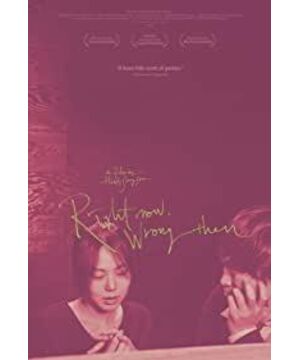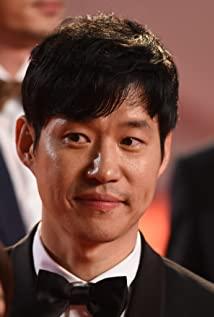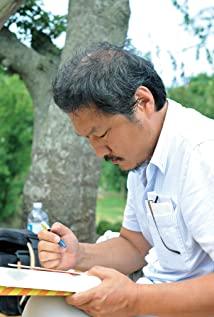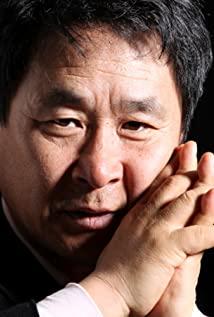Foreword:
After the Oscars in 2020, Feng Junhao has become a world-class director, and he is also an iconic figure in the world of Korean films. But when it comes to the first person who made Korean films to the world, another person must be mentioned: Hong Sang-soo.
He is "the first filmmaker in Korea". In 1996, Hong Shangxiu completed his debut film "The Day the Pig Falls into the Well", which was released in South Korea with the momentum of the independent filmmaking movement. That year, neither Park Chan-wook nor Bong Joon-ho could really debut.
Last week, Hong Sang-soo successfully won the Best Director Award at the Berlin Film Festival for his self-written and directed "Woman That Runs", completing the grand slam of the Korean filmmaker in the three major European film festivals: Cannes, Berlin and Venice.
He was able to win the favor of major film festivals and finally complete a historic breakthrough, there is no controversy. What is controversial is that he moved his movie spirit into reality, talked about the same love as in the movie with the heroine of his movie, he directed his movie, and his movie directed his life.
Korean filmmakers in 2020 are a bit ruthless. After "Parasite" swept the major film awards, another person in the Korean film industry stood at the pinnacle of the international A-level film industry.
He is director Hong Sang Soo .
With the self-written and directed "Woman That Runs" successfully won the Best Director Award at the Berlin Film Festival, Hong Sangxiu also made up for the main award of the Berlin Film Festival, the only Korean film festival that has not been conquered. After Kim Ki-duk's "Saint" won the Golden Lion at the Venice Film Festival and Bong Joon-ho's "Parasite" won the Palme d'Or, the Korean film has successfully completed the grand slam of the three major European film festival awards.
There is a saying that "play is like life", Hong Sangxiu has really achieved a seamless connection between life and movies. His movies and his life are in a situation where the boundaries are blurred, which has made him what he is today. received criticism.
- 1. Hong Sangxiu, who lives in the movie: Sooner or later, he will win the prize, and sooner or later there will be an accident
In fact, from the perspective of Hong Sangxiu's film style, his award is definitely a matter of sooner or later. The key is whether his personal exposure meets the attention of filmmakers in the industry. And from his experience in the past five years, Hong Sang-soo's story is completely a copy of the plot of the film he directed. As a result, his off-the-spot press exposure in the public eye far outstrips his work itself.
In 2015, during the filming of "Right Now, Wrong Then", Hong Sang-soo and Kim Min-hee, who played the heroine in the movie, had a spark. At that time, he still had a family, and Kim Min-hee was a new actor who could not be ignored in the Korean film industry, and what made everyone who eats melons even more incomprehensible is that he once publicly communicated with Korean king-level male movie stars such as Lee Jung-jae and Zhao In-sung. Kim Min-hee, who had been in a relationship with, actually disregarded human ethics and insisted on being with Hong Sang-soo, who was more than 20 years older than him and was not single.
But as long as you delve into Hong Sang-soo's personality, you will feel that this Korean director has a very artistic idea, which is very attractive to a purely artistic actor like Kim Min-hee .
- 2. Strong stylization: expressing deviant feelings in a simple space
In his early years, Hong Shangxiu liked to drink soju and chat with his friends about life. In addition, he lived in a family engaged in writing and publishing. His way of looking at the world was very Buddhist. When he graduated from high school, he did not take the Korean university aptitude test. He chose to stay in his mother's bedroom listening to classical music, and sometimes he would learn to conduct in it, and was often left alone thoughtfully.
The gradual weirdness of living habits made Hong Sangxiu have some psychological problems. In the winter of 1928, he came to a hotel and swallowed a bottle of sleeping pills and planned to commit suicide, but fortunately, he was found and rescued. In order to make him feel at ease and do something to adjust this state of mind, his mother found several piano teachers for him, but in the end it was all over, because Hong Shangxiu and his teachers were in love.
Later, Hong Shangxiu came to the United States to study abroad, majoring in drama creation, during which he read a lot of novels by Sartre and Camus. And fell in love with the works of French film masters Robert Bresson and Eric Rohmer. These have a great influence on his future film creation.
Hong Shangxiu's movies have a fixed formula, and some people even assert that: Hong Shangxiu has been making a movie all his life, " He restores life to a quagmire, exuding a dirty and lewd beauty ".
In his films, the plot is usually: the hero and heroine meet in ordinary circumstances, the theme is the blurring of feelings, the conversation place is mostly a simple space for two people, and they are either drinking soju or wandering indifferently. At first glance, you don't see drama and storytelling in his films, which are realistically supported by embarrassing character relationships - a man who betrays his marriage and a single woman with an inexplicable background.
This point is surprisingly consistent with Bresson's pursuit of real and natural life scenes and the pursuit of concise and clear narratives . The whole story relies entirely on the dialogue between the hero and heroine to promote the development of the plot. And the theme of this conversation can be summed up in two words: embarrassing chat.
In Hong Sang-soo's films, the characters are always the unchanging core, and how people deal with the established humanistic ethics is the unchanging center of conflict in his films. This is because Sartre does not deal with the relationship between the environment and the characters according to the principles of traditional drama, but provides a certain environment for the characters, emphasizing that the characters choose their own actions in the environment, create their own essence, and express their own character and destiny. coincidentally. At the same time, he has also been talking about the contradiction between love and morality, which, like Rohmer's films, examines the relationship between the sexes through conventional human relations.
This strong presence leads to the style of Hong Sang-soo's films - expressing deviant feelings in a simple space.
Therefore, in his story, the male protagonist is always an intellectual and always has a family, but only because of a chance encounter has a feeling for the female protagonist. However, this kind of derailment is expressed as normal, soft, and even recognized by the heroine.
This can understand why the first film he collaborated with Kim Min-hee, "Right Now, Wrong Then", was restricted to those under the age of 19 without restriction-level elements. Because this kind of unethical story is so clean and beautiful in Hong Sang-soo's camera, you will wonder what a real marriage relationship is like. This is difficult for most people to accept.
Hong Sang-soo's artistic awareness and emotional awareness are quite advanced and very attractive. In layman's terms, for many young literary and artistic young people, this kind of feeling appears poignant and beautiful when they cannot get it, and the content of the film that only focuses on the two people ignoring the views around them has an illusory sense of development in another time and space.
From the above, Hong Sangxiu's films have a very unique artistic style, and the way of expressing stories is very advanced and born out of Western culture, so there is no dispute that he can win the favor of major film festivals and finally win the award.
The crux of the controversy is that he moved his movie spirit into reality, and talked about the same love as in the movie with the heroine of his movie. This kind of emotional outlook may be what Hong Sang-soo has always wanted. It is not controlled by worldly rules and is completely determined by mutual liking of the essence. This is evidenced by the fact that he and Kim Min-hee have officially confirmed their relationship and still have not divorced, and despite having a wife and family and the court not allowing divorce, he is still resolutely in love with Kim Min-hee despite being criticized by almost all the people. .
- 3. The eternal theme: the instinct of love is tortured by secular morality
However, in Hong Sangxiu's film, the love between the male and female protagonists is separated by a layer of paper, which is not finally pierced, and falls into a situation that seems to be tortured because of it.
In "Night by the Sea Alone", which allowed Jin Minxi to win the Berlin actress, the story of the two of them, Yongxi's love concept is always a spiritual dissatisfaction.
When the male protagonist said "I love you because you are too beautiful", Yongxi also responded lightly with "I don't thank you very much". As she said to her sister, "I don't care much about a man's appearance", the love she longs for is not just based on the desire for the body and appearance, but on the basis of equality, the collision between two hearts interact with. For such a love ideal, the more persistent Yongxi is, the more disappointed he will be. And the male protagonist has been carrying this kind of love all the time, because of family reasons, he has been unable to really accept this feeling. I can only make a very bold confession with the strength of the wine: When it comes to the troubles of extramarital affairs, it seems that there is a monster in my heart. I want to break free, but I regret it all the time, which makes people almost suffocate. For the two of them, the instinct to face love was restricted because of the secular world, and it became a kind of torture.
The irony of this mundane view, Hong Sangxiu again through his own "After". At the beginning of the movie, the famous critic, Feng Wan, was questioned by his wife if he had an affair. He looked innocent and explained to his wife helplessly. But just a few steps out of the house, several self-slapped shots of embracing a third party, and flashback shots of taking the subway together alternately appeared. The wife, on the other hand, caught up with Fengwan's company to catch the rape, but misunderstood Ya Rin, who just went to work on the first day, a few slaps, a conversation, repeated cover up, and the story slowly flowed.
After that, under the coercion of his wife and daughter, Shanwan returned to the family and achieved great success in his career. But for him, this is "giving up life", giving up his right to love.
No matter how attractive the love in Hong Sang-soo's films is, this kind of love cannot be regarded as a normal social ethics, and these can only exist in Hong Sang-soo himself.
Borrowing a sentence from "YI Heyuan" to sum up his concept: " What is morality? When two people are together, this is called morality. "
Conclusion:
Movies come from life but are higher than life, especially Hong Sangxiu's movies. He extended and enriched some thoughts and moments that occasionally flashed in life, and finally turned them into a movie that is a bit awkward and a bit beautiful. This thought and moment is likely to be degenerate and not accepted by the world, but it is also real.
Hong Sangxiu's films are also in this kind of crampedness, extruding the essence of human nature. Many of his film lines are awkward chats, but these awkward chats show the real appearance of beings through the screen. This is the charm of the film, and it is also the artist's ability to refine and summarize life.
View more about Right Now, Wrong Then reviews











